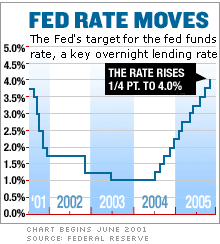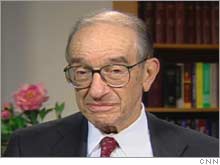 |
 |
| Alan Greenspan's 18-year tenure at the helm of the Fed is due to end Jan. 31, 2006. |
|
|
|
|
|
NEW YORK (CNN/Money) -
The Fed raised interest rates another quarter of a percentage point Tuesday, a move almost universally expected on Wall Street, but one that also had investors wondering what the post-Greenspan Fed would do next year.
The latest rate hike comes during a time of transition for the Federal Reserve. Alan Greenspan's more than 18-year term as Fed chair will draw to a close at the end of January, and last week, President Bush nominated former Fed governor Ben Bernanke to succeed Greenspan -- a choice widely expected to be approved by the Senate.
The Fed boosted its target for the benchmark federal funds rate, which influences what consumers and corporations pay for various types of loans, to 4 percent, the highest level since the spring of 2001. It was the twelfth consecutive quarter-point rate hike by the central bank, which has been raising rates since summer 2004 in a bid to keep inflation from becoming a major threat to the economy.
In its heavily scrutinized statement, the Fed said that it would keep raising rates at a "measured" pace. That phrase is interpreted by many to signal that quarter-point increases are likely at the Fed's next meetings on December 13 and January 31.
The Fed, as it did when it raised rates in September, dismissed concerns about an economic slowdown due to Hurricane Katrina.
In its statement, the Fed said "elevated energy prices and hurricane-related disruptions in economic activity have temporarily depressed output and employment," but added that economic growth would "likely be augmented by planned rebuilding in the hurricane-affected areas."
The Fed added that it still did not believe inflation to be a major cause for concern, despite high oil and gas prices.
Although the "cumulative rise in energy and other costs have the potential to add to inflation pressures," the central bank's policy-makers said, "core inflation has been relatively low in recent months and longer-term inflation expectations remain contained." That language is virtually identical to what the Fed said in September. (Full story).
Some had hoped that the Fed would eliminate the "measured" language in this statement since inflation still does not appear to be a significant worry. Nonetheless, the decision to raise rates was unanimous this time around. In September, Fed member Mark Olson voted in favor of a pause.
On Wall Street, stocks recouped some of their losses following the announcement but were set to close lower. (Full story). Treasury bonds edged lower, boosting the yield on the 10-year note to 4.57 percent from 4.55 percent Monday. Bond prices and yields move in opposite directions. (Full story).
In a largely symbolic move, the Fed also raised its discount rate charged on loans to banks a quarter point to 5 percent.
Will Ben keep hiking...
Several economists said that by the time Bernanke takes over as Fed chairman, it's very likely that the fed funds rate will be at 4.5 percent. That's because the Fed, by keeping the "measured" terminology as well as similar sentences about its inflation outlook, gave investors no reason to suspect that it will pause in the next few months.
"What's remarkable is how little the statement changed," said David Kelly, economic advisor at Putnam Investments in Boston. "The one thing that is important is that the Fed has always, over the past few years, tipped its hand. But they have still not indicated that they are close to ending their tightening."
So where rates will go after Greenspan leaves is anybody's guess. Kelly said Bernanke is likely to keep raising rates once he takes over in order to ensure a sense of continuity and prove that he can fight inflation as effectively as Greenspan.
"Bernanke's first job will be to maintain the rough course set out by his predecessor," Kelly said.
David Wyss, chief economist with Standard & Poor's, said that the Fed could avoid putting Bernanke in an awkward position by raising rates a half of a percentage point at its December meeting. That way, the Fed could pause in January since rates would already be at 4.5 percent. And Bernanke's first act as central bank chief would not be a departure from the last act of the Greenspan Fed.
But Wyss said that if the Fed chooses to raise rates by just a quarter of a point in December and January, then Bernanke could risk looking "soft" on inflation if the central bank pauses next March. Wyss argues that the Fed probably has a little more room to keep boosting rates before it has to begin worrying about the rate hikes causing a slowdown.
"Going up to 5 percent is not out of the question. A half point beyond 4.5 percent will not make the difference between growth and a recession," Wyss said.
...or will he pause?
Still, not everyone agrees. John Norris, chief economist with Morgan Asset Management, an investment firm based in Birmingham, Ala., said that a rate hike by Bernanke at his first meeting as Fed chair on March 28 is not a foregone conclusion, regardless of what the Fed does in December and January.
Norris thinks Bernanke will need to keep a close eye on how consumer spending shapes up over the next few months.
He said that if the holiday shopping season is weak, as some expect, then Bernanke will need to be careful. More rate hikes in the face of weak consumer spending could hurt the economy, he said.
"Bernanke will have to prove his mettle as an inflation fighter but he does not want to risk sending the economy into a tailspin," Norris said. "If the holiday shopping season is bad, the Fed could pause at his first meeting."
And James Glassman, senior economist with J.P. Morgan Chase, said that if anything, relatively high energy prices are more of a threat to economic growth than to inflation.
He pointed to weak automobile sales in October as a sign of the consumer getting squeezed. Faced with that backdrop, he said it's more important for Bernanke to make sure the economy stays on track than to show Wall Street that he can be tough on inflation.
"I think anybody in the Fed chief position realizes that the job is not about proving credentials. It's about doing what's right for the economy," Glassman said.
-----------------------
Why some investors are worried about Bernanke. Click here.
Where mortgage rates are likely to end up. Click here.

|